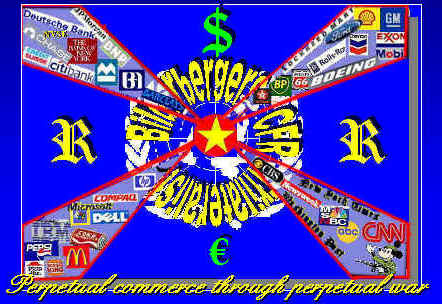SCOTTSDALE, ARIZONA A Year-end 2008 Editorial by Bob Djurdjevic Oil Industry, Not Just Bankers, Knocked Down U.S. Economy to Its Knees Squeezing the Consumer Dry Greed Was the Fuel That Drove Both Bankers and Oilmen to Try to Squeeze Blood Out of Stone (American Consumer) SCOTTSDALE, Dec 30 - Ever since the "subprime" crisis broke into the
public domain some 16 months ago, the bankers have been taking the well
deserved rap for most that seems to ail the American economy these days.
But there are other culpr They say, "a picture's worth a thousand words." So take a look at the above charts. They show how greedy oil companies spiked the retail gasoline prices in the U.S. (middle right), as the OPEC cartel and its other cohorts in the oil industry did the same with the crude oil prices (right). It was clearly a self-destructive move given the weakened U.S. economy in the first half of 2008. But they did it anyway. Why? Greed as Fuel of Poor Judgment Well, one theory we've heard is that since most of the leading OPEC countries are Arab, they wanted to use the oil as a weapon of financial terrorism to destroy the U.S. economy. We don't buy that. First, because the U.S. is OPEC's biggest customer. Why would they
be killing the goose that lays the golden egg? Second, without a
strong U.S. political and military support, these sheiks would be swept from
power by the Islamic militants in their countries. So they know which
side their bread is buttered on and how to toe the line. Okay, so if it's not financial terrorism, what is it? Try sheer stupidity (left chart). Greed can be a blinding emotion that can cloud good judgment. That's evidently what happened in the oil industry last summer, when they put on a choke hold on a patient that was already struggling to get some oxygen. So the U.S. consumer found himself squeezed from two sides at the same t "The further erosion of the consumer confidence index reflects the rapid and steep deterioration of economic conditions that occurred in the fourth quarter of 2008," said Lynn Franco, director of the Conference Board's Consumer Research Center. "The overall economic outlook remains quite dismal for the first half of 2009, and only a modest recovery is expected in the second half." The recor On the other hand, the tightening of credit by the ailing banks caused the U.S. households' debt to declined for the first time in history, the Federal Reserve reported earlier this month (Dec 11). Stung by the loss of $2.81 trillion in their net wealth, people paid down their debts in the third quarter for the first time since at least 1952, since such records have been kept. But hold your horses. Put that champagne back on ice. Our shopaholic society can't be been cured so easily of a spending disease that took over half a century to develop. The U.S. central bank also reported that the debt taken on by the federal government soared by 39% to a postwar record. Which means the taxpayers are still stuck with the debt for all those banking and auto-industry bailouts. We'll just have to pay it through taxes rather than directly to the banks. Bleak Outlook Should Be Tempered Meanwhile, compounded negative economic pressures have already led to a
contraction in the U.S. GDP in the third quarter, and are likely to make the
fourth quarter GDP the deepest recession this country has seen since the
Great
Again, hold your horses. We should remember that similarly, three years ago, there was unbounded optimism pervading the public opinion. And we all know what followed... a slide into an economic abyss. So given that masses' sentiment pendulum tends to swing wildly to extremes at each end, we would caution against being overly pessimistic at this time, especially when it comes to equities that have taken a real beating in the last six months (see the table belo). There are some pretty good bargains available right now (like Apple, Google, IBM, Accenture, HP... to mention some).
They may not pay off big in the short term. But such investments could be a start of a nice new nest egg for the long term. Russian Professor: U.S. to Disintegrate in 2010 On the other hand, some foreign experts are predicting not just a slow recovery, but no recovery. Russian Prof. Igor Panarin says that mass immigration, economic decline, and moral degradation will trigger a U.S. civil war next fall and the collapse of the dollar. Around the end of June 2010, or early July, he predicts, the U.S. will break into six pieces -- with Alaska reverting to Russian control. "When I pushed the button on my computer and the map of the United States disintegrated (left), hundreds of people cried out in surprise," he remembers. He says most in the audience were skeptical. "They didn't believe me." Well, we would not have been surprised. This writer predicted the same thing over 13 years ago in a Nov 1995 TiM article, and later also in a Washington Times column "When Cultures Collide..." (Aug 1996). And we redrew the borders of the new entities that are actually quite close to that of Prof. Panarin's. With one big difference: We expected that to happen by circa 2050, not 2010, as the Russian expert is opining. "Bosnia is both 150+ years behind the U.S. and 50+ years ahead," this writer said. "It is 150+ years behind because its war was not unlike the U.S. Civil War. Even though most of the Serbs were for the Yugoslav "Union," the Bosnian Serbs acted as "Confederate" forces fighting against the domination of the Muslim-Croat Federation - the "Union" troops. But Bosnia is also 50+ years ahead of the U.S. because our country is certain to disintegrate along racial or ethnic lines as Bosnia did."Meanwhile, back to Prof. Panarin's analysis, his was not some sort of a glib remark in a third-rate paper. Yesterday's (Dec 29) Wall Street Journal carried a major story quoting the Russian professor. He thinks, for example, that California will form the nucleus of what he calls "The Californian Republic," and will be part of China or under Chinese influence. Texas will be the heart of "The Texas Republic," a cluster of states that will go to Mexico or fall under Mexican influence. Washington, D.C., and New York will be part of an "Atlantic America" that may join the European Union. Canada will grab a group of Northern states Prof. Panarin calls "The Central North American Republic." Hawaii, he suggests, will be a protectorate of Japan or China, and Alaska will be subsumed into Russia. A former KGB analyst, in post-Soviet Russia, Prof. Panarin got a doctorate in political science, studied U.S. economics, and worked for FAPSI, then the Russian equivalent of the U.S. National Security Agency. He says he did strategy forecasts in the 1990s for then-President Boris Yeltsin, adding that the details are "classified." Nowadays, he is frequently quoted by the Russian media as expert source. Argentine Financial Crisis Led to Destruction of Middle Class Okay, so if Prof. Panarin's prediction may be too "off the wall" for you, how about we sneak a look into the past? "Those who do not learn from history are doomed to repeat it," goes an old saw. Six years ago, just like the U.S. today, Argentina was reeling in the midst of a financial crisis. In its aftermath, the country's middle class virtually disappeared. Could that happen in our country? Check out this excerpt from a Washington Post Feb 2002 story:
While we can skeptically debate whether or not Prof. Panarin's dire prediction of an imminent U.S. demise will come true within the next two years, we cannot argue with history. And it is a historical fact that a similar financial crisis in Argentina has practically wiped out its middle class, the urban poor and the farmers. Is that also in the cards for us here in the U.S.? Well, we don't expect to see people in this country fighting over road kill meat any time soon, if ever. But there's no question that we live in a plutocracy in which the rich are getting richer and the poor are getting poorer. The divide between the have's and the have-not's had already widened even before the latest recession (see The Great Divide Widens, Oct 2008). It is only likely to get worse next year. And that will invariably lead to increased tensions between the various social strata. Banding Together: Best Defense against Governments But "one man's loss is another man's gain," as they say. And the current economic downturn is creating buying opportunities for those people who are not strapped for cash; who have not overextended themselves with debt or other leveraged investments. As I have said before, there are plenty of quality stocks now available at bargain prices. Furthermore, as I put it in my Christmas 2008 Editorial, if we all pull together and help each other directly, neighbor-to-neighbor, friend-to-friend, rather than wait for the government to do it, "we could collectively build the biggest mountain of goodwill the world has ever seen. And that would pull us out of this recession quicker than any government actions, which only set us back while helping the culprits." --- Bob Djurdjevic is a writer and consultant based in Scottsdale, Arizona. You can find more of his research and columns at www.truthinmedia.org (geopolitical) and www.djurdjevic.com (business).
Also check out... The Great Divide Widens (The rich are getting richer and the poor poorer in most developed countries – latest OECD study, Oct 2008); Wall Street's Financial Terrorism (a 1997 Chronicles Magazine column that's as current today as it was when it was written); Just Say NO to Greed - Killer of Dreams! (Mar 2008) and Just Say No to Greed 2 (Oct 2008); Also, “Plutocrats of the New World Order,” Mar 1997; “Demo Farce and the American Century,” Nov 1996; “The Great Wall Street Hoover,” Nov 1997; “The Great American Divide,” Jan 1998; “Wiping Out the Middle Class,:” May 1998; “When Will Wall Street Bubble Burst?”, Aug 1998; etc.
|

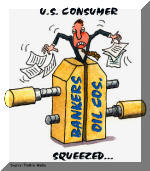

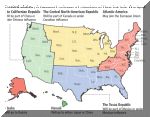
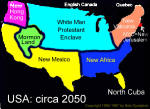
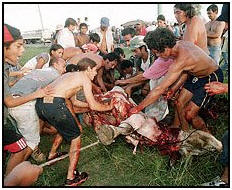 and carving knives. Suddenly, according to accounts from some of those
present on that March day, a cry went up.
and carving knives. Suddenly, according to accounts from some of those
present on that March day, a cry went up. 